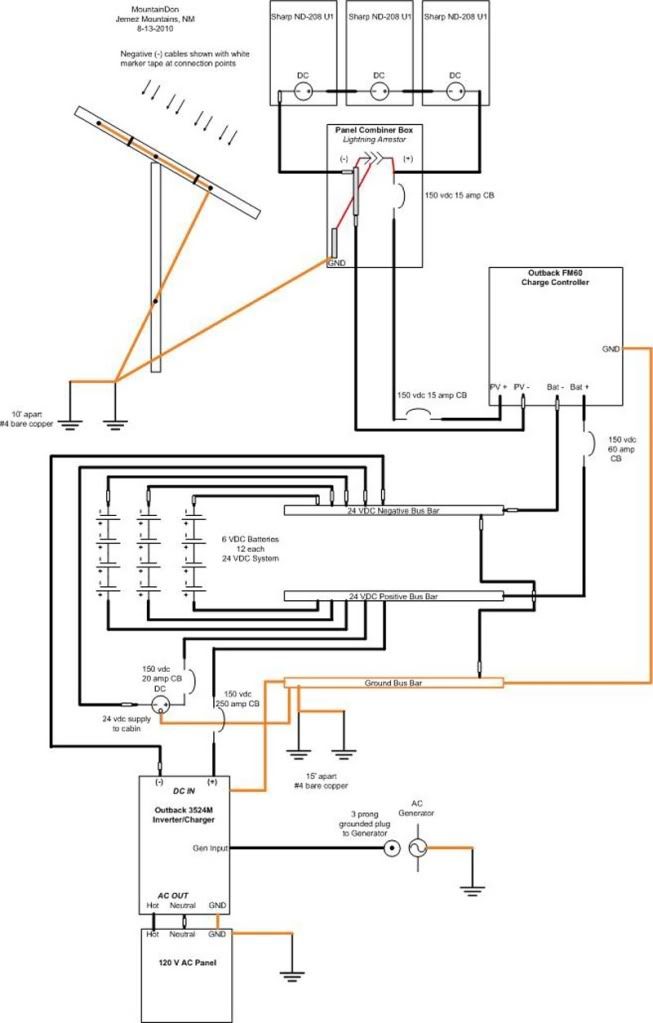questions about solar wiring,,, shunts & fuses etc!
Hi Everybody!,, ive been lurking here for 18 months or so and finally joined
there is so much great info on here but some how have overlooked a discription and/or schematics of a solar systems design with all componets labeled such as shunts, fuses, emergency shut off etc!,,,
im going to be using atleast 2-230watt panels,45-60amp mppt controller,6-208ah 6v gc batteries and a 1000-1500watt pure sein inverter,, and might add one more panel if I have enough room,,,ive read n worried so much about this my brain is starting to rattle,
ive read that fuses are sometimes placed on the neg side in the system which I dont understand!
SO!,, #1 what size shunts and located where in system?
#2 what sized fuses and located where
#3 do I need more than one shutoff switch
#4 charging!,, other than the solar I do have a 3500watt generator so should I install an rv converter or a quality 3 stage battery charger that I can run off the gen?
I was just planning to wire up an old 30amp cable off old rv into a breaker/fuse box.
my breaker/fuse box is out of 79 coachman mh and has a converter with generator disconect in it but figured the charger in it wasnt even close to todays standards,, so by using the breaker box part of it to control the 110/12v system ,,, which would be best for the $,, a new charger I can wire into a seperate circuit or a new rv converter?,, I might add im not going to be doing much,, if any camping in a normal camp site but boondocking for weeks at a time!
my ct isnt a new fancy one I was lucky enough to buy from factory but for $1000.00 my 12x7 tandom axle in just the size I wanted and it'll do anything a new one will do and I dont have to worry about that first scratch,, lol,, its been pulled thru the woods plenty !
I thank u guys in advance and feel fortunate to have found this wonderful site!
thX again!
there is so much great info on here but some how have overlooked a discription and/or schematics of a solar systems design with all componets labeled such as shunts, fuses, emergency shut off etc!,,,
im going to be using atleast 2-230watt panels,45-60amp mppt controller,6-208ah 6v gc batteries and a 1000-1500watt pure sein inverter,, and might add one more panel if I have enough room,,,ive read n worried so much about this my brain is starting to rattle,

ive read that fuses are sometimes placed on the neg side in the system which I dont understand!
SO!,, #1 what size shunts and located where in system?
#2 what sized fuses and located where
#3 do I need more than one shutoff switch
#4 charging!,, other than the solar I do have a 3500watt generator so should I install an rv converter or a quality 3 stage battery charger that I can run off the gen?
I was just planning to wire up an old 30amp cable off old rv into a breaker/fuse box.
my breaker/fuse box is out of 79 coachman mh and has a converter with generator disconect in it but figured the charger in it wasnt even close to todays standards,, so by using the breaker box part of it to control the 110/12v system ,,, which would be best for the $,, a new charger I can wire into a seperate circuit or a new rv converter?,, I might add im not going to be doing much,, if any camping in a normal camp site but boondocking for weeks at a time!
my ct isnt a new fancy one I was lucky enough to buy from factory but for $1000.00 my 12x7 tandom axle in just the size I wanted and it'll do anything a new one will do and I dont have to worry about that first scratch,, lol,, its been pulled thru the woods plenty !
I thank u guys in advance and feel fortunate to have found this wonderful site!
thX again!



